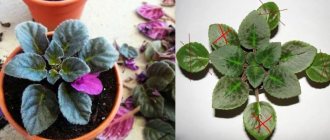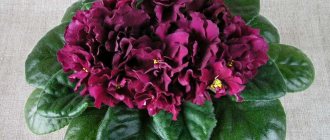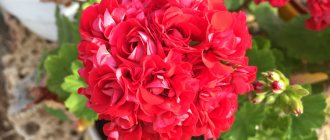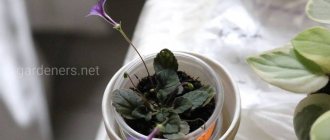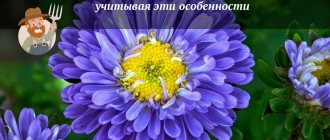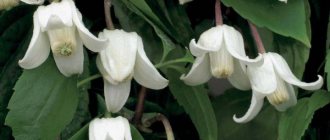Of course, it is quite difficult to grow a violet, but these indoor flowers are full of beautifully varied colors of the inflorescences. Violet Bride's Bouquet is a variety with the most real grace; violets have impeccably white inflorescences, which is why this plant is especially distinguished among other varieties of Saintpaulia. The flowers of the plants are very delicate, fluffy and snow-white, they look like light clouds, so violets of this variety are definitely mesmerizing, so flower growers around the world love to grow these plants.
Violet Froze in Time
Beautiful violet Froze in Time.
The name of the variety Frozen in Time means Frozen in Time .
The name of the variety translates as frozen in time.
The rosette is standard, reaches 25 cm. The foliage is quilted , light in color. The variegation is beige, like Tommy Lowe. White fringing appears best in cooler temperatures. The rosette is even, the leaves lie in neat rows. A photo of the Froze in Time violet is shown below.
Saintpaulia has a standard socket.
The flower is in the form of a white single or semi- double star, cup-shaped . The dark green rim can be very wide and occupy more than half of the petal. The flowers have streaks of white and light green. Sometimes a light lavender color may appear on the surface of the petals.
The variety has a short peduncle.
Violet flower stalks:
- Erect;
- Short;
- Durable.
Each one produces 9 or more buds . It has abundant and long-lasting flowering. After the first buds bloom, flowering continues throughout the season without stopping. At the same time, the outlet remains as it was.
One flower, after full opening, can last up to 8 months . Organizes good bouquet flowering. The buds open very slowly.
Even in the summer heat there is a green color on the petals, but the border:
- Not very wide;
- And it has no clear boundaries.
After the onset of cool weather, the new buds give the correct green color . On one rosette you can simultaneously observe flowers from three waves of flowering.
Violet knows how to play sports.
Frozen in Time is one of the few varieties that are able to form buds and produce full flowering even in December without additional lighting.
The Frozen in Time variety has two official sports - Frosty Frolic (L/Lyon) and Ko`s Green Dragonfly (S.Ko).
Frosty Frolic (L/Lyon) - Frosty prank.
Frosty Frolic and Frozen in Time.
Transition from variety to sport.
This sport has good quality indicators . Variety:
- Forms an even rosette;
- Gives long, lush and abundant flowering.
The sport variety grows and blooms well at home.
In hot weather, the border becomes less noticeable, and no changes are observed . The lavender hue, which is the hallmark of the variety, remains the same, regardless of the conditions.
Ko`s Green Dragonfly (S.Ko).
Ko`s Green Dragonfly (S.Ko) is a chimera that tends to turn a more pronounced purple color during hot periods. It produces very few shoots, and in order to get a full-fledged plant, you have to cut off and re-root the top of the rosette. Of the stepchildren, only every second one inherits maternal qualities.
Possible sport option.
Violet SM-Bride's Bouquet (Seedling Morev)
Like other varieties of Uzambara violets, SM-Bride's Bouquet belongs to the Gesneriev family.
History of the variety
Uzambara violet “Bride's Bouquet” is a seedling created by domestic breeder Konstantin Morev in 2009. One of its best and most popular seedlings. This variety, like his other creations:
- Easily recognizable;
- Lush;
- And dense caps of flowers with star-shaped, large inflorescences with corrugated edges.
And all this beauty is located on a compact symmetrical rosette .
This seedling is often confused with the Moreva Wedding Bouquet variety, which also has huge double-snowy ruffled flowers, but differs in that the double stars have a green ruffle that disappears when the flower opens at high temperatures.
Photo and description of the variety
Violet Bridal Bouquet Morev - standard, with a compact symmetrical rosette . This variety is delightful, with huge crystal white flowers, the size of which ranges from 4 to 6 cm. The contrast of the dense cap of flowers on the green leaves looks gorgeous.
Violet Bride's Bouquet was created by Konstantin Morev.
ATTENTION! The leaves of the rosette have a slightly quilted texture and are rich green in color.
Sports
The SM-Bride's Bouquet variety - according to collectors, generally rarely mutates and goes into sport. But rosettes that did not bloom with varietal color are also worthy of attention. Most often, instead of white, pink, blue or blue are used.
Pink sport violet.
Pink sport SM-Bride's Bouquet - large double flowers, soft pink.
Pale blue sport of Saintpaulia.
Soft blue sport SM-Bride's Bouquet . White flowers, with a smooth color transition to blue. Each flower is like a separate work of art, even though the flowers themselves are smaller than those of a varietal plant.
Big pink flower sport.
Huge pink sport . Densely double flowers, with a soft pink center, which turns into a whiter shade towards the paradise of petals, all this beauty is emphasized by very wavy petals.
Large pink Saintpaulia flowers.
Caring for a plant at home
Violet Frozen in Time is not capricious, and grows well at home . Forms a rosette with a diameter of up to 25 cm. The rosette is not always neat, the stems are often confused with each other, and in order to form a cap flowering, it is necessary to remove some leaves.
How to water correctly
For some gardeners, the Frozen in Time violet feels great with wick watering , but for beginners it is easiest to organize regular watering.
The plant needs constant feeding . During the formation of the rosette, fertilizers containing nitrogen are applied. After the buds begin to bloom, the violet is fed with potassium-phosphorus fertilizers.
Lighting and air temperature
Violet loves light, and with proper and sufficient natural light it forms a beautiful and round rosette . It also feels great under phytolamps.
The optimal daylight hours are 10-12 hours , but the violet manages to produce abundant blooms even with less sunlight.
When there is insufficient light, the petioles become slightly (or very much) elongated.
Saintpaulia does not like heat . In summer, the green border floats a little, but the color on the petals is still present. As cool weather sets in, the lines on new flowers that have just opened become much clearer and brighter.
If the lighting is sufficient, the bush begins to resemble a fluffy ball.
Also, the variety does not like cold. In such conditions, the plant begins to rot, become sick, and may die completely.
Air humidity
Prefers standard conditions with humidity from 50 to 65% . Excessive dryness leads to:
- Curling of leaves;
- And the flowers turn brown.
Too high humidity can lead to rotting and fungal infection of the bush.
Soil composition
Violet grows well in light and loose soil . The roots must have access to air.
The soil should be:
- Moderately humid;
- Excessive humidity;
- Or dryness has a bad effect on the condition of the plant.
Pruning and hygiene
The bush blooms for a long time. On one rosette there can be flowers of three waves of flowering. After the flowers begin to turn brown, they should be removed . Old leaves are also periodically cut off.
Sometimes it is necessary to remove young leaves closer to the center if they interfere with the formation of a proper rosette.
Reproduction methods
The variety is not very prone to forming side shoots , just like its official sports. But the method of reproduction by stepsons is possible.
Most often, Frozen in Time violet is propagated by petioles . For this purpose, choose a leaf that is located directly next to the peduncle. It takes root well and produces a sufficient number of shoots, but to be completely confident in the plant, you should wait for flowering. He often goes into sports. This phenomenon is possible even after the third or fourth “correct” flowering.
Frozen in Time likes to get a little naughty sometimes.
When breeding official sports, a similar situation is observed, especially with chimeras.
Since the variety is considered to be constantly blooming, it is not necessary to wait for a lull before replanting . Can be replanted in a blooming state (if necessary).
Replants about once a year in a new pot with fresh soil. After relocation, it is not recommended to feed the plant for 2 months.
Rejuvenation of the old bush is possible . To do this, the rosette is carefully cut off at soil level, a thin layer of bark is scraped off the stem and rooted in water. After this they are planted in the soil.
Photo and description of the variety, characteristic features
The violet variety Wedding Bouquet belongs to the Gesneriev family, the genus Saintpaulia Hybrid.
Expert opinion
Nesterova Olga Nikolaevna
Specialist in landscaping, master of landscape design. Indoor floriculture consultant
The flowers of this violet are characterized by large sizes. They reach 7 cm in diameter. The shape of the flowers is snow-white stars with wavy edges. The center of the flower is yellow. The color of the petals is double: the outer part is blinding white, the inner side is covered with a silvery ash-colored coating.
This makes the bouquet seem to float in a bluish haze. Flowers remain fresh for a long time and do not fade within 2-3 weeks. The next flowering is observed after 1-3 months
During budding, a green border forms along the edges of the petals. As it grows, the green color fades, leaving the petals completely white. At first, the flowers are scattered.
As the next buds open, the bouquet becomes more and more full. There are 4-7 buds on each peduncle. At the extreme stages of flowering it resembles a wavy white ball.
The green border on the petals appears when grown in cool conditions. As the temperature rises, the green color fades.
In summer, violet blooms without a border at all and often with simple flowers.
The rosette grows evenly, is symmetrical, small in size, and does not lose its decorative appearance with age, because the leaves do not grow to the sides or down.
The leaves are light green. The surface is smooth with a glossy shine.
There are two types of socket:
- With rounded leaves . More often, greenery is retained on the petals during flowering, while being more picky about the quantity and quality of water. If there is too much moisture, it may stop blooming.
- With straight pointed leaves . This violet is a sport from the main species, and is characterized by particular durability and fertility. Does not require painstaking care.
For lovers of spectacular Saintpaulias, we recommend paying attention to the following varieties of Saintpaulias: “Raisin”, “Dance of the Galaxy”, “Duchess” and “Amadeus”.
Reviews about violet
Viola, Ryazan. “The variety is very unpretentious, produces green flowers and variegated leaves under any conditions. But my bush gave a blue color on the fourth flowering. Unfortunately it needs to be updated. Now this bush has gone to a new owner, who is very happy with this acquisition.”
The variety has many positive reviews.
Lena, Bryansk. “The variety is good, but you can never be sure that young rosettes will not go into sports. You never know what color a new plant will be.”
About the history of the creation of the variety
Violet Bridal bouquet: photo
The violet variety Bride's Bouquet was developed relatively recently, 10 years ago, by breeder K. Morev. This violet is easy to recognize among other varieties due to its particularly beautiful, snow-white inflorescences. The caps of the flowers are quite dense, star-shaped, the large edges of the petals are wavy and terry. And the rosette always has a symmetrical shape, so the plants look great on window sills. But this variety should not be confused with the Wedding Bouquet, they are really very similar, but the Bridal Bouquet has fewer inflorescences, and its double stars are greenish.
Features of flowering, growth and reproduction
reproduces quickly at home . From the moment the cuttings take root until the buds form, it takes 8 to 9 months. The buds take root very slowly, and the flowering period is protracted.
They propagate by cuttings and side shoots, and can be used as a sport . Sometimes the sport produces flowering close to the variety.
The plant, obtained from a sport cutting, received a rosette, which produced flowering close to the variety.
Peduncles are strong and most often erect . But sometimes they get confused with each other, and instead of a beautiful bouquet you get chaos.
In such cases, the rosette is thinned out and care is taken to ensure that it is formed correctly.
An important role in the formation of a rosette is played by:
- Lighting;
- Temperature;
- And humidity.
The minimum flowering time is 9 months. One bud can bloom up to 8 months after opening. In most cases, violets bloom constantly.

